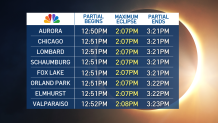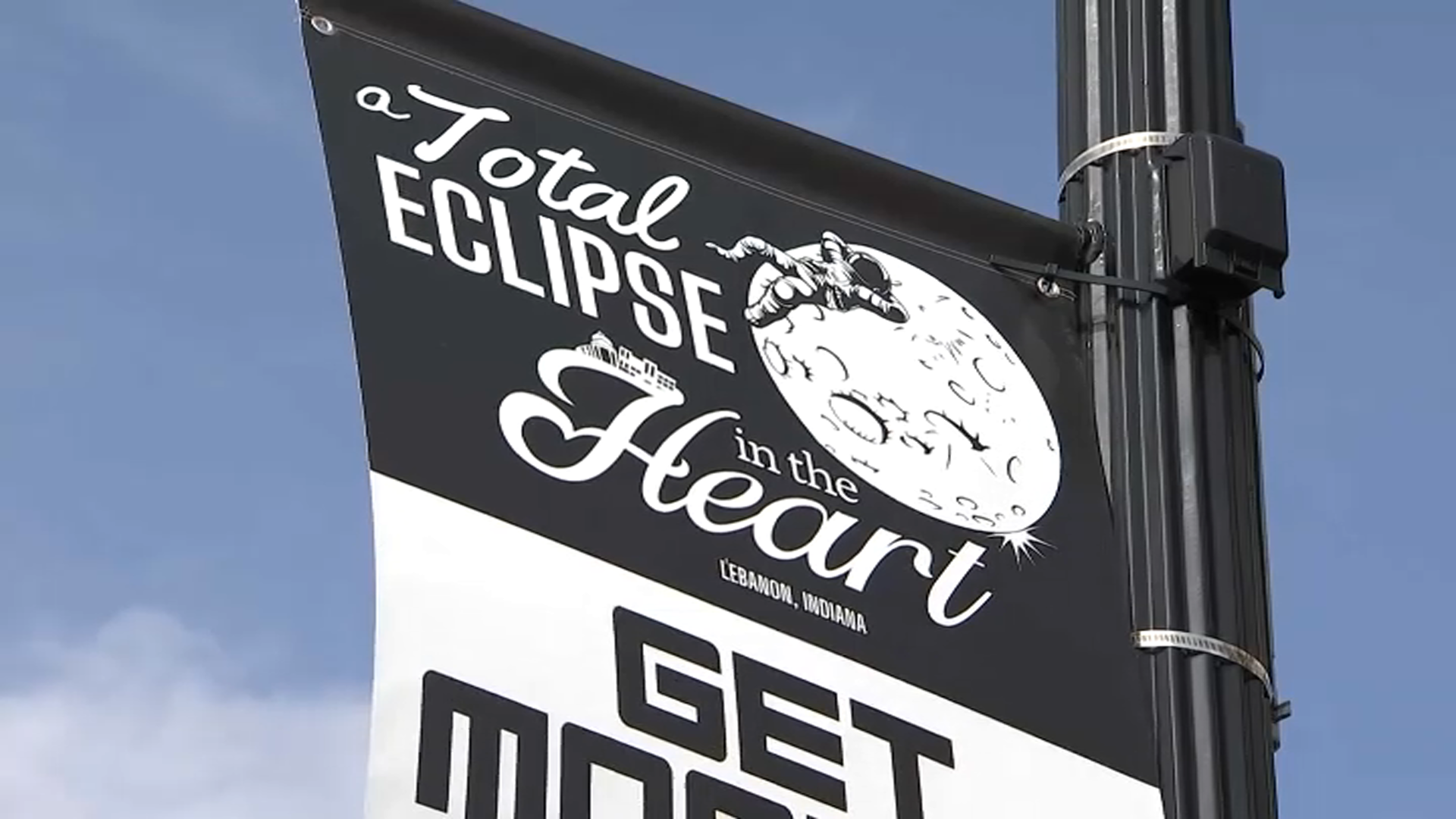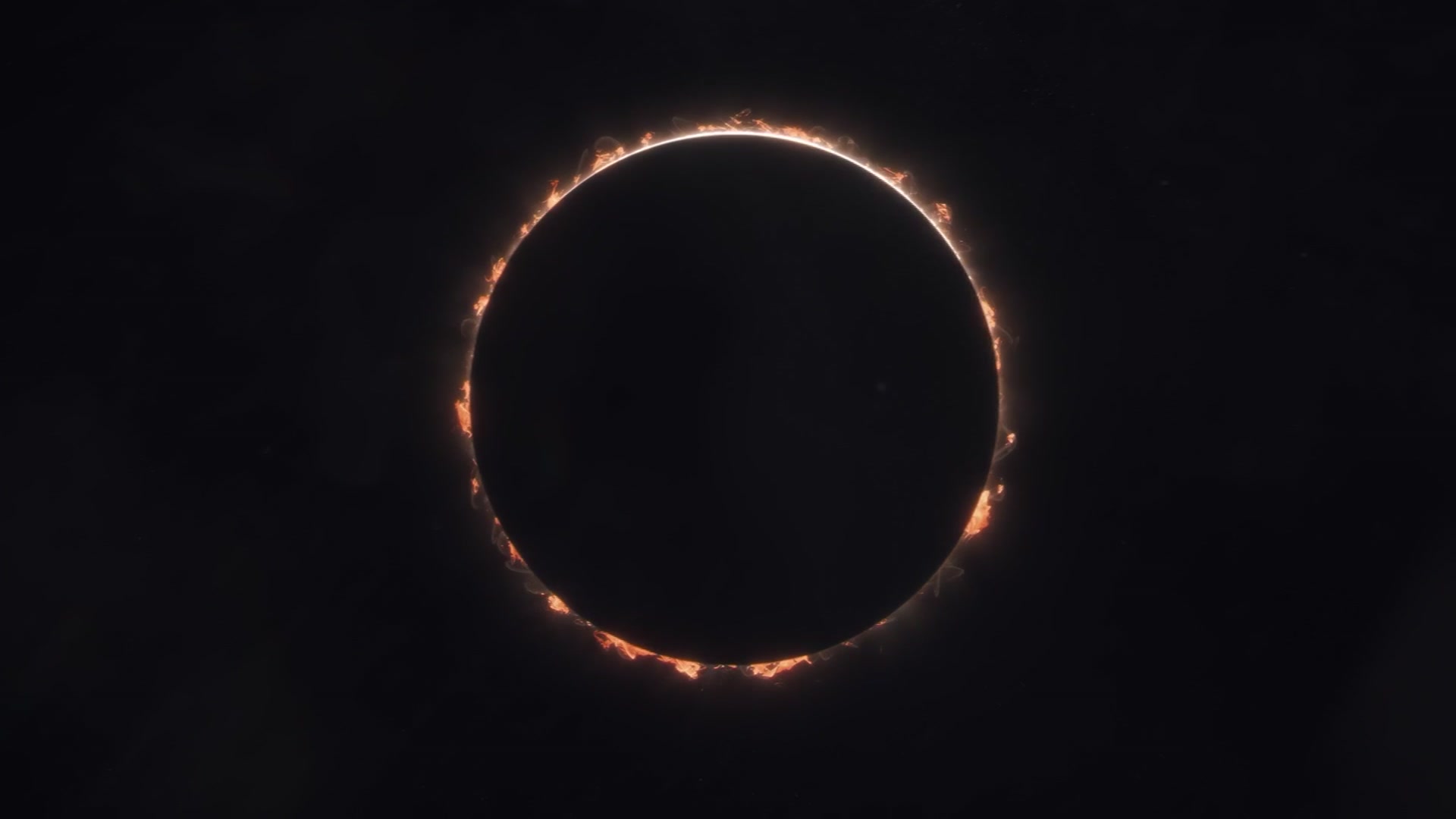Editor's Note: Live coverage of the eclipse from the path of totality begins in the player above starting at 7 a.m. Tune in for live totality starting at 1:55 p.m.
Look up! Monday afternoon, a total solar eclipse will occur, giving more than a dozen states and countless cities the chance to see a rare astronomical phenomenon that won't be visible again in the U.S. for another 20 years
Several Midwestern states are in the path of totality for Monday's event, including Illinois, Indiana and Ohio. In Chicago, a partial solar eclipse will occur, with approximately 94% of the sun covered.
"The solar eclipses that are going to occur, for the most part, that are going to be visible in our area after this one will not be to the extent that this one is," Michelle Nichols, director of public observing at the Adler Planetarium, told NBC Chicago. "So we're going to see 94% of the sun covered [in Chicago] and pretty much all of them in the next several decades in our area won't feature the sun covered at 94%. So if you want to see that, this is going to be your last chance for quite a while."
"This might be the most-watched solar eclipse ever," Nichols added.
MORE: Some solar eclipse glasses have been recalled. Here's what to know
NBC 5 Storm Team Meteorologist Kevin Jeanes called the event "the greatest solar eclipse across the U.S. in our lifetime."
What is a total solar eclipse?
According to NASA scientists, a total solar eclipse occurs when the new moon intersects the path of the sun in the sky, causing the sun to be partially and then nearly completely blocked from view.
Feeling out of the loop? We'll catch you up on the Chicago news you need to know. Sign up for the weekly Chicago Catch-Up newsletter.
In Carbondale, the largest Illinois city included in the path, totality will commence at approximately 1:59 p.m. Totality is expected to end at approximately 2:03 p.m. as the eclipse follows a diagonal line over Fairfield and exits at Mount Carmel, according to state officials.
If you'll be in the Chicago area that means you won't be able to see the eclipse in totality -- but there is a silver lining: The partial eclipse will be visible for a while longer. For areas outside of the path of totality like Chicago, solar eclipse glasses must be worn.

Here's a city-by-city breakdown of what you can expect and when, according to Time and Date. Check your city here.
Cook County:
Chicago
Partial eclipse begins: 12:51:28
Maximum eclipse: 2:07:41
Partial eclipse ends: 3:22:02
Evanston
Partial eclipse begins: 12:51:38
Maximum eclipse: 2:07:45
Partial eclipse ends: 3:22:00
Orland Park
Partial eclipse begins: 12:50:48
Maximum eclipse: 2:07:10
Partial eclipse ends: 3:21:42
Schaumburg
Partial eclipse begins: 12:51:05
Maximum eclipse: 2:07:10
Partial eclipse ends: 3:21:29
DuPage County:
Aurora
Partial eclipse begins: 12:50:22
Maximum eclipse: 2:06:37
Partial eclipse ends: 3:21:07
Lombard
Partial eclipse begins: 12:50:57
Maximum eclipse: 2:07:09
Partial eclipse ends: 3:21:33
Wheaton
Partial eclipse begins: 12:50:48
Maximum eclipse: 2:07:00
Partial eclipse ends: 3:21:25
DeKalb County:
DeKalb
Partial eclipse begins: 12:50:03
Maximum eclipse: 2:06:09
Partial eclipse ends: 3:20:36
Lake County:
Fox Lake
Partial eclipse begins: 12:51:29
Maximum eclipse: 2:07:20
Partial eclipse ends: 3:21:26
Kendall County:
Plainfield
Partial eclipse begins: 12:50:19
Maximum eclipse: 2:06:39
Partial eclipse ends: 3:21:14
Illinois cities in the path of totality
For those looking to be in the path of totality, here's a list of Illinois cities that fall in that category, according to the Illinois DNR:
Carbondale
Totality begins: 1:59:15
Maximum eclipse: 2:01:20
Totality ends: 2:03:25
Makanda
Totality begins: 1:59:09
Maximum eclipse: 2:01:14
Totality ends: 2:03:19
Alto Pass
Totality begins: 1:58:56
Maximum eclipse: 2:01:01
Totality ends: 2:03:06
Fairfield
Totality begins: 2:01:19
Maximum eclipse: 2:03:21
Totality ends: 2:05:23
Olney
Totality begins: 2:02:12
Maximum eclipse: 2:04:07
Totality ends: 2:06:03
Golconda
Totality begins: 2:00:39
Maximum eclipse: 2:02:04
Totality ends: 2:03:30
Effingham
Totality begins: 2:03:25
Maximum eclipse: 2:03:49
Totality ends: 2:04:13
Mt. Vernon
Totality begins: 2:00:35
Maximum eclipse: 2:02:28
Totality ends: 2:04:20
Marion
Totality begins: 2:01:53
Maximum eclipse: 2:03:54
Totality ends: 2:05:56




